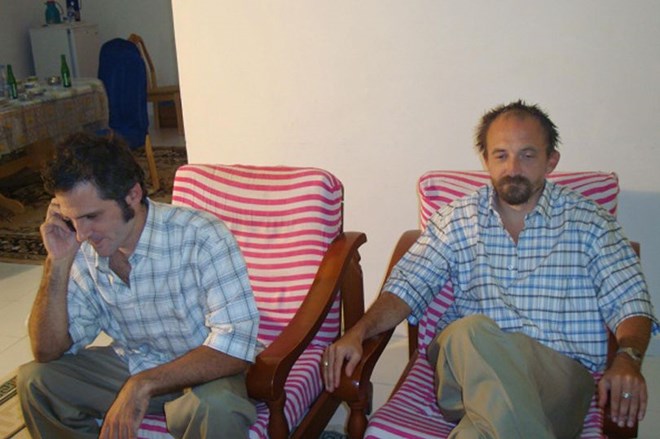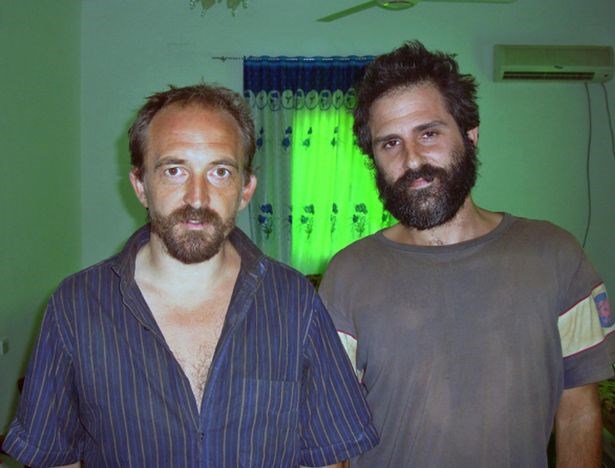
Saturday November 6, 2021
'The food wasn't bad actually'

Spanish photographer Jose Cendon [L] is pictured making a phone call January 4, 2008 following release along with a British reporter, Colin Freeman [R] at Somalia's breakaway Puntland state's port town of Bosaso after six weeks in captivity. The two were kidnapped almost six weeks ago in Bosaso along with two Somali journalists with whom they had been working and were held in mountain ranges, south-west of the port city that has grown in reputation as the launch-base for piracy and kidnappings of especially foreigners, for ransom. AFP PHOTO/STRINGER (Photo credit should read STRINGER/AFP via Getty Images) (Image: 2009 AFP/Getty Images)
We all have bad days at work, but they don’t get much worse than being kidnapped by the people who are paid to protect you.
MyLondon spoke to journalist Colin Freeman, 52, who was taken for ransom for six terrifying weeks in 2008 while investigating Somalia’s piracy problem.
Piracy had been a problem for a few years in Somalia, but when hijackers took over Saudi Arabia’s ‘Sirius Star’ oil tanker the issue became big news.
Having been to Somalia once before, Colin was sent out to investigate the issue further.
Colin was working in Bosaso, a city on Somalia’s northern coast. He said that he had had a smooth stay, but on his last day his worst nightmare turned into reality.
“The very people we’d paid to protect us kidnapped us, and we subsequently learned that they were pirates moonlighting as bodyguards in order to kidnap us,” said Colin.
“Part of the piracy epidemic included a culture of hostage taking, and that spread from sea to land.
As a seasoned foreign correspondent, Colin was aware of the dangers in entering lawless zones.
He said: “Having worked in places where kidnapping is a thing, like Iraq, there's a sense that something might happen.”
On the last day of his trip Colin and his colleague and photographer, José Cendon, were driving through Bosaso in a pick-up truck, with the bodyguard’s truck just ahead of them.
When all of a sudden the bodyguard’s motor screeched to a halt, and some of the guards leapt out, one of whom had a “snarl on his face, looking angry.”
Then, more bodyguards - armed to the teeth with Kalashnikovs - flew out the pickup truck and ordered Colin and José out of the car.
“It was at that point when my feet hit the floor that I thought 'oh s**t, we’re getting kidnapped',” said Colin.
The now-hostages were forced to grab their belongings and were bundled into the guards-turned-kidnappers' truck.
“We then shot off at high-speed, the rest of them were all hunched in the back.
“The guy who was sat by us on the seats tried to put a hood over my head so I couldn’t see where we were.”
But this didn’t deter Colin from trying to contact the UK. He recalls how at one point he tried to subtly reach for his mobile phone so he could tip the office off that something had gone wrong.
He was rewarded by being smashed over the head with a gun butt.
He said: “It's a massive shock when it happens. You try and think ‘could I escape?'
“I was thinking we have a short amount of time while we're still in the town, the further out of town we get the less chance you have of escaping.
“But the moment people have a gun pointed at you the instinct is just to do exactly what you're told.”
The car quickly exited Bosaso and entered a desert full of sand dunes, heading in the direction of a mountain range.
“For the next half an hour we drove at high speed across this desert, bouncing over these sand dunes.
“I remember being very impressed by the driver’s driving technique, he was racing over the sand dunes like a rally driver.”
The group entered the foothills of the mountains, drove up a track until the car could go no further at which point they were ordered out and were forced to walk up a canyon at gunpoint.
This ended up being a two-day trek to the first of the six caves the hostages were kept in.
Colin doesn’t know why he was moved around so much, but he suspects it was so they weren’t found by the police, or worse, other kidnappers.
Two days into the trek, they were handed over to a larger group of around a dozen men led by a man called Yusuf.

Colin and Jose were taken captive by their own bodyguards
Colin says Yusuf’s trademark accessory was a laptop bag “with a Qur’an in it and a couple of stick grenades.”
“They were very heavily armed, and they were disciplined as well,” he said.
“When we were moving through the mountain terrain they’d have a scout out front and a scout at the back. They looked like a military unit, and looked like they knew what they were doing.
He added that the kidnappers never had any arguments, not even a raised voice was heard.
As far as kidnappings go, Colin says he and José were treated relatively well and there weren’t any moments where he thought he was going to die.
However the ordeal was littered with nasty incidents, including when Colin was forced to phone the UK with a gun at his head.
Initially the pirates demanded a ransom for the duo's release - $3million dollars each, “and that demand was communicated to The Telegraph office in London.”
But when it became clear that the steep demand was getting nowhere, the kidnappers became angry.
“There was one particular kidnapper we used to call the ‘old b*****d’, because he was grandpa-looking, but tough, and he was the gang enforcer.
“As time went on he took to eyeballing me, so whenever I looked up he had his eye on me, just as a psychological intimidation tactic.”
On one of the many proof-of-life phone calls to the UK, the ‘old bastard’ became aggressive and cocked his gun in front of Colin “in a theatrical flourish,” as if to suggest when Colin got on the phone to the office “he was either going to shoot me in the foot or do something nasty.
“It was obvious from then on, that if things didn’t go their way, their treatment would get worse.
“So when the next phone call was made about five days later I was quite scared because he made his intentions clear last time, and I thought ‘God knows what he’s going to do this time’.
“That was the moment I thought they were going to start torturing us and so forth, luckily they didn’t. The mere thought of something like that is bad enough.”
But that wasn’t the only low point of Colin’s hostage situation.
Towards the end of the kidnap Colin and José were told they’d get released, but on the penultimate day of their captivity they were told the plans of release “were all over” following a gang argument.
Colin was told of the argument and that they’d keep him for another year if needs be, at which point his heart sank.
“I remember thinking, ‘Hmmm I don’t know if I can cope with that’.”
Surprisingly though, Colin was kept well nourished.
“The food wasn’t bad actually,” Colin recalled.
They were fed goat meat with rice, goat meat with spaghetti, and roast goat.
“(They ate goat) pretty much for breakfast, lunch and dinner.
“It was a bit monotonous and it wasn’t the tastiest food, but it was solid, fair, and there was always plenty of it.”
Somali tea was also regularly on the menu, which Colin details as being served with six spoons of sugar per cup.
“Boiled water boiled on the campfire, therefore clean. And sugar, therefore energy.
“It wasn’t great for the teeth but it was otherwise okay.”
Another food-related moment which surprised Colin was when the pirates offered the captives sweet treats.
They were walking up the canyon after being first abducted, the party came to a clearing and stopped.
It was at this point Colin thought this may not be a kidnapping: it may be an execution.
Then to his surprise, one of the kidnappers rifled through a rucksack “and like a boy scout leader, produced some Mars Bars and a couple of bottles of water and shoved them in our hands and went ‘you, eat!’”
Colin couldn’t help but see the funny side of the situation, giving it his own twist on the Mars’ slogan.
“A Mars a day helps a kidnapper work, rest and play,” he quipped.
To which José replied: “I’d rather have had a Snickers.”
This was a big moment for the pair as it was the first time they’d found humour during the kidnapping.
“It’s moments like that that really make a difference with your ability to cope, and it’s important you do, as you have plenty of time to be miserable.”
Despite his horrendous ordeal, Colin concedes that a couple of the younger pirates “were quite friendly.”
None of the captors spoke much English, but they and Colin were still able to communicate “in a pidgin of English and Arabic” as Colin could speak a bit of the latter tongue.
Colin recalls how at one point one of the “younger lads” came over, introduced himself, and became excited at the captives being from the UK.
“Ah! Britain, Britain, Thierry Henry, Arsenal!” the captor exclaimed, which surprised Colin slightly, as there was a kidnapper in the remote mountains in Somalia speaking the international language of football.
The rapport didn’t stop there, Colin got a bit of the captor’s life story and he told them how his parents had been killed during one of Somalia’s civil wars, and how he’d been deported from Greece after trying to smuggle himself over the Mediterranean.
Another of the captors earned the title of “the guy of the cigarettes” as he would give Colin and José five cigarettes each per day.
The cigarette man had “quite an impressive presence,” Colin recalled.
“He was very, very calm, despite being under a lot of pressure you would imagine.”
And if that wasn’t surprising enough, one of the pirates even offered to stay in touch by email.
“It was strange, because it showed that some of them didn’t really know what they were doing, and that we’d leave as best mates,” he said.
Fortunately there was nobody who tormented the pair for fun, Colin says.
There was of course the ‘old b*****d’, “but when he was nasty it was strictly for business reasons, he didn’t do it for the hell of it.”
Then one day Colin and José were told they were being released.
His employers had used hostage negotiators, and to this day he doesn’t know if a ransom was paid.
The following day they were marched up a mountain path by the captors, and handed over to a group of even more heavily armed men carrying rocket propelled grenades.
These men took the captives down a mountain path and handed them to a group of clan elders, who’d been appointed as intermediaries, and they were taken back to Bosaso and flown to safety.
When he was eventually released, Colin returned to the UK and saw a councillor but they quickly concluded that he didn’t have any form of PTSD at all.
Colin puts this down to not being alone during the kidnap, not being tortured, and not being held for a long time.
In many ways, Colin’s kidnap was worse for his family than it was for him, hence why he doesn’t really forgive the captors as they put his family “through hell.”
“I understand that growing up in a country as poor as Somalia you have more excuses than many people would to get involved in that sort of criminality.